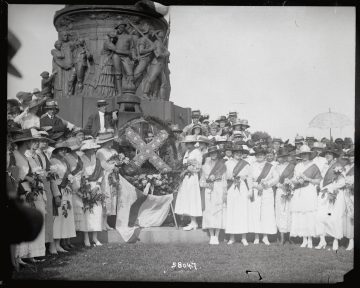Henry Louis Gates Jr in The New York Times:
 Joe Biden launched his presidential bid in April with a bold defense of the principle that “all men are created equal,” a principle he rightly argued that, from Thomas Jefferson on, “we haven’t always lived up to.” But, Mr. Biden added, this is something “we have never before walked away from,” and that’s where he went wrong. Like most Americans, the former vice president forgets the period ironically known as Redemption, the movement that followed the abolition of slavery and ended 12 years of America’s first experiment in interracial democracy — Reconstruction — with a systematic, multitiered, terrorist-backed rollback, when the defeated Confederate South, as the saying went, “rose again.”
Joe Biden launched his presidential bid in April with a bold defense of the principle that “all men are created equal,” a principle he rightly argued that, from Thomas Jefferson on, “we haven’t always lived up to.” But, Mr. Biden added, this is something “we have never before walked away from,” and that’s where he went wrong. Like most Americans, the former vice president forgets the period ironically known as Redemption, the movement that followed the abolition of slavery and ended 12 years of America’s first experiment in interracial democracy — Reconstruction — with a systematic, multitiered, terrorist-backed rollback, when the defeated Confederate South, as the saying went, “rose again.”
The Redeemer base consisted primarily of white Southern Democrats whose most urgent intention was to neutralize the black vote, which under the protection of United States troops during Reconstruction had shown astonishing power in sending Republican majorities to Southern statehouses. (It is worth remembering that Democrats and Republicans occupied positions opposite to those of today’s parties with regard to “states’ rights” until around 1964.) In what we might think of as the first “Freedom Summer,” in 1867, some 80 percent of the black men eligible to vote in 10 of the 11 former Confederate states registered, and soon they were sending delegates to new state constitutional conventions on the basis of equal citizenship. Almost no one had anticipated the passion of the freedmen for the franchise (women didn’t get the vote until 1920), and in the 1868 presidential election, the ballots marked by these black men provided the margin of victory in the popular vote for Ulysses S. Grant. Black power had reared its head, and with it came more muscular state governments embracing investments in infrastructure and the region’s first statewide public school systems.
More here. (Note: Throughout February, at least one post will honor The Black History Month. This year’s theme is “African Americans and the Vote.” Readers are encouraged to send in their suggestions)
